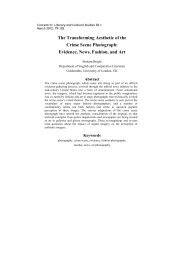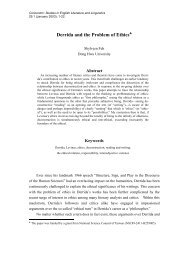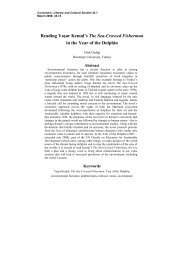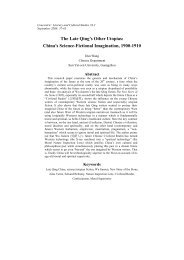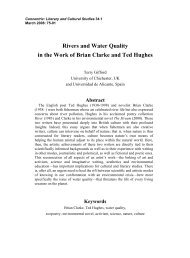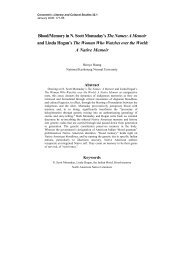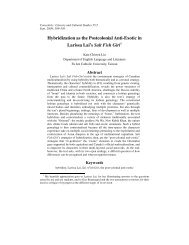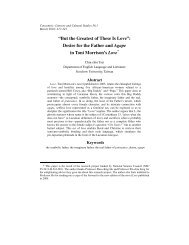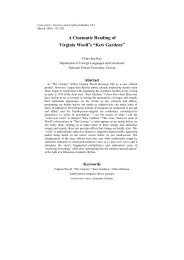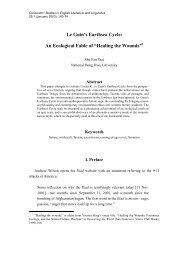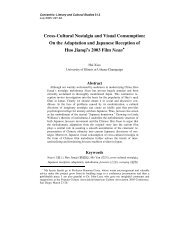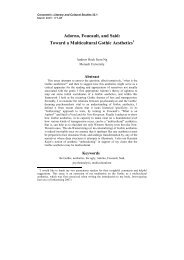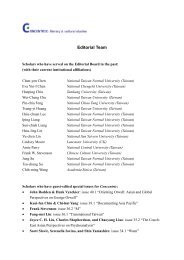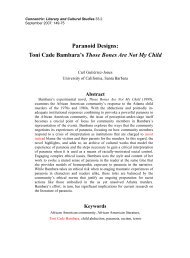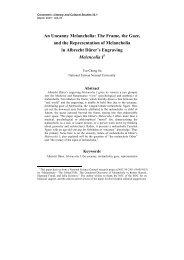The Gaze of the Other in Ang Lee's Crouching Tiger ... - Concentric
The Gaze of the Other in Ang Lee's Crouching Tiger ... - Concentric
The Gaze of the Other in Ang Lee's Crouching Tiger ... - Concentric
You also want an ePaper? Increase the reach of your titles
YUMPU automatically turns print PDFs into web optimized ePapers that Google loves.
28.1 (January 2002)<br />
Heaven too transcendental (or perhaps Christian as aga<strong>in</strong>st Buddhist) a “sp<strong>in</strong>” would<br />
after all set us back with<strong>in</strong> what is, accord<strong>in</strong>g to <strong>the</strong> standard comparative view<br />
mentioned above, a Western metaphysical framework. But we can also read this cave<br />
as a not-quite-Platonic one, and this l<strong>in</strong>e as suggest<strong>in</strong>g a sort <strong>of</strong> <strong>in</strong>def<strong>in</strong>ite<br />
“suspension” 8 —which frees one from limits—ra<strong>the</strong>r than a (totaliz<strong>in</strong>g) “conclusion.”<br />
This read<strong>in</strong>g is strongly suggested by <strong>the</strong> second and f<strong>in</strong>al climax that, closely<br />
follow<strong>in</strong>g it, echoes <strong>the</strong> first: stand<strong>in</strong>g with her lover T<strong>in</strong>y <strong>Tiger</strong> on <strong>the</strong> top <strong>of</strong> a high<br />
cliff near a famous Buddhist temple, Beloved Dragon suddenly jumps and, as <strong>the</strong> film<br />
ends, rema<strong>in</strong>s suspended (or float<strong>in</strong>g, hover<strong>in</strong>g) <strong>in</strong> <strong>the</strong> air.<br />
A Lev<strong>in</strong>asian read<strong>in</strong>g does after all compel us to resist <strong>the</strong> temptations (stronger<br />
no doubt <strong>in</strong> <strong>the</strong> film than <strong>in</strong> <strong>the</strong> novel) <strong>of</strong> a vertical-transcendent “O<strong>the</strong>r” here, and<br />
focus ra<strong>the</strong>r on <strong>the</strong> purely horizontal (and social) self-negation or self-becom<strong>in</strong>g-o<strong>the</strong>r<br />
<strong>of</strong> <strong>the</strong> world-weary but still liv<strong>in</strong>g Mu-bai. 9 What may be clearer <strong>in</strong> <strong>the</strong> (more purely<br />
“Ch<strong>in</strong>ese”) novel than <strong>in</strong> <strong>the</strong> film is <strong>the</strong> importance <strong>of</strong> Mu-bai’s relationship with <strong>the</strong><br />
young woman, Beloved Dragon: he becomes concerned about her, wants to control<br />
(for her own sake) her “wildness” and guide her on <strong>the</strong> “correct path.” Thus after first<br />
meet<strong>in</strong>g her Mu-bai assumes a responsibility which now beg<strong>in</strong>s to consume him; he<br />
abandons any dream he might have had <strong>of</strong> a future for himself (for <strong>in</strong>stance, <strong>the</strong><br />
ever-deferred dream <strong>of</strong> still marry<strong>in</strong>g Hsiu-lian) and becomes what Lev<strong>in</strong>as would call<br />
a fully ethical be<strong>in</strong>g, one who negates him/herself by putt<strong>in</strong>g him/herself fully <strong>in</strong> <strong>the</strong><br />
service <strong>of</strong> ano<strong>the</strong>r (an “o<strong>the</strong>r”). But it is almost as if Beloved Dragon “expands” with<br />
<strong>the</strong> added force or presence <strong>of</strong> her o<strong>the</strong>r (Mu-bai) “with<strong>in</strong>” her: she becomes<br />
<strong>in</strong>creas<strong>in</strong>gly egocentric and hedonistic (as we also clearly see <strong>in</strong> <strong>the</strong> film) as Mu-bai<br />
gradually “decreases,” loses his subjectivity. We could also say that Mu-bai, ra<strong>the</strong>r<br />
than wish<strong>in</strong>g to construct or expand his own subjectivity based on dreams <strong>of</strong> <strong>the</strong> future<br />
and <strong>the</strong> old “warrior code,” welcomes <strong>the</strong> o<strong>the</strong>r’s (Beloved Dragon’s) “disruption” <strong>of</strong><br />
his world, welcomes <strong>the</strong> full disruptive force <strong>of</strong> <strong>the</strong> “face” <strong>of</strong> <strong>the</strong> o<strong>the</strong>r, becomes a<br />
truly Lev<strong>in</strong>asian anti-hero. As his o<strong>the</strong>r’s desire (or “o<strong>the</strong>r desire”) po<strong>in</strong>ts toward <strong>the</strong><br />
<strong>in</strong>f<strong>in</strong>ite and wishes to reach <strong>the</strong> “beyond”—this is aga<strong>in</strong> <strong>the</strong> <strong>in</strong>def<strong>in</strong>ite (<strong>in</strong>f<strong>in</strong>ite)<br />
suspension <strong>of</strong> Beloved Dragon’s climactic plunge from <strong>the</strong> cliff—Mu-bai’s negated or<br />
8 See preced<strong>in</strong>g note on Mu-bai’s dy<strong>in</strong>g words. In Plato’s Republic <strong>the</strong> “philosopher” escapes from <strong>the</strong><br />
cave <strong>of</strong> “mere appearances” up <strong>in</strong>to <strong>the</strong> sunlight <strong>of</strong> “true forms” (“reality”); but <strong>Ang</strong> Lee gives us a ray<br />
<strong>of</strong> sunlight slant<strong>in</strong>g down <strong>in</strong>to <strong>the</strong> darkened cave, suggest<strong>in</strong>g not so much that this cave may already<br />
picture or po<strong>in</strong>t to a “transcendent” world as that (once aga<strong>in</strong>) <strong>the</strong> transcendent/immanent duality or<br />
hierarchy has been broken down, <strong>the</strong> “difference” suspended.<br />
9 And <strong>the</strong> Ch<strong>in</strong>ese sense <strong>of</strong> Mu-bai’s dy<strong>in</strong>g words may be (note 7) that he doesn’t (one doesn’t) really<br />
die; ancestral spirits are still part <strong>of</strong> a this-worldly extended family.<br />
194



